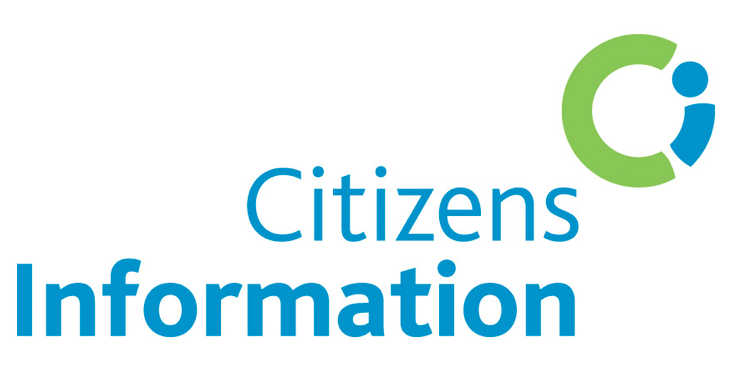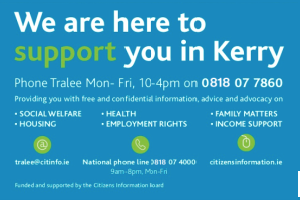 Know Your Rights has been compiled by Kerry Citizens Information Service which provides a free and confidential service to the public…
Know Your Rights has been compiled by Kerry Citizens Information Service which provides a free and confidential service to the public…
The Student Grant Scheme is the main financial support scheme for students but there are other supports available, including:
• The Student Assistance Fund
• The Fund for Students with Disabilities.
Student Assistance Fund
The Student Assistance Fund (SAF) provides financial support to full-time or part-time students in higher education who are experiencing financial difficulties. The SAF is available to help students with the following costs:
• Books and class materials
• Rent, heating and lighting bills
• Food
• Essential travel
• Childcare costs for students that are parents
• Medical costs
• Family difficulties, for example bereavement.
The SAF is designed to provide financial support in addition to the student grant. Tuition fees, registration fees, student loan repayments or any costs borne by your college are not covered by the SAF. Universities, institutes of technology and other approved colleges participate in the SAF scheme but the SAF is not available to students in further education or post-leaving certificate colleges.
Continued below…
Qualifying for the Student Assistance Fund
To qualify for the SAF, you must be a full-time or part-time student in a university, institute of technology or other approved college. You must be on a course leading to a higher education award (National Framework of Qualifications level 6-10).
Rates
Funding amounts vary and will be decided by your college following an assessment process.
How to apply
Students must apply for the SAF directly to the individual colleges. If you are in financial difficulty you should contact the access or student services section in your college for more information on how to apply for the SAF. It is important to apply for funding as soon as you can. Some colleges have a closing date for applications. You should check with the access service or student services section of your college to find out when this is.
Your college will advise you on the documentation needed to support your application to the SAF. This may include proof of your own or your parents’ income and receipts for costs such as rent, bills or childcare. Applications are assessed by individual colleges and final decisions on awards may be taken by a small committee, including the access officer and student welfare officer.
Fund for Students with Disabilities
The Fund for Students with Disabilities (FSD) is one of the main funding sources for students with disabilities. The fund ensures eligible students have the necessary help and equipment so that they can participate on an equal basis with other students. You may be entitled to support under the FSD even if you did not access college through the Disability Access Route to Education (DARE scheme).
The FSD covers the following supports:
• Assistive technology equipment and software
• Non-medical helpers (for example, personal assistants or note takers)
• Academic or learning support
• Deaf supports including sign language interpreters and speedtext
• Transport support
Continued below…
Participating colleges
The FSD is available to full-time or part-time students in universities, institutes of technology and other colleges, including UK and EU colleges. The FSD is also available to students in further education or post-leaving certificate colleges. Funding is allocated to the college to support a student’s needs as decided by a needs assessment. The college is responsible for managing the funding and has full discretion on how the FSD is allocated.
Qualifying for the Fund for Students with Disabilities
To qualify for the FSD, you must fulfil the following conditions:
• Have a disability in one or more of the categories outlined below
• Meet the nationality and residency criteria outlined below
• Be a full-time or part-time student
• Have a verified need for specific supports in order to attend your chosen course.
Qualifying disabilities
Disabilities that qualify under the FSD are:
• Autistic Spectrum Disorder
• Attention Deficit Disorder
• Attention Deficit Hyperactivity Disorder
• Blind or vision impaired
• Deaf or hard of hearing
• Developmental co-ordination disorder (dyspraxia/dysgraphia)
• Mental health condition (for example bipolar disorder, schizophrenia, clinical depression, severe anxiety, severe phobias, OCD, severe eating disorders and psychosis)
• Neurological condition
• Significant ongoing illness
• Physical or mobility
• Specific learning difficulties (dyslexia or dyscalculia)
Residence
You must have been resident in the State for 3 of the previous 5 years before your approved course commences to qualify for support under the FSD. If you do not qualify at the beginning of your course, it is still possible to meet this requirement during the course of your studies. This should be reviewed at the beginning of an academic year.
Nationality and immigration status
In order to get the FSD you must be a national of an EEA member state or Switzerland, or have immigration status or leave to remain. You can read more detail on the nationality and residency criteria.
How to apply
You cannot apply directly to the FSD, applications should be made on your behalf by your college.
You must register with the disability support services in your college. You will need to show medical verification of your disability (for example, a consultant’s report). The college will then carry out a needs assessment to identify the appropriate supports required.
You should contact the student services or disability office in your college for more information.
Other Financial Supports
Other financial supports for students include the Bursary for Care Experienced Young People is available, if you have had care experience of at least 6 months before your 18th birthday.
The 1916 Bursary Fund provides funding to encourage participation and success by students from disadvantaged backgrounds that are significantly under-represented in higher education.
The Department of Further and Higher Education, Research, Innovation and Science (DFHERIS) runs a number of scholarship schemes including, the Ernest Walton STEM bursary, the Professor William C Campbell Bursary Scheme, the All Ireland Scholarship Scheme and the European University Institute Scheme.
• If you need further information about or you have other questions, you can call a member of the local Citizens Information Service in Kerry on 0818 07 7860. They will be happy to assist you and if necessary arrange an appointment for you.
Kerry HELPLINE 0818 07 7860
Monday to Friday from 10am -4pm. Alternatively you can email on tralee@citinfo.ie or log on to www.citizensinformation.ie
The National Phone Service is available on 0818 07 4000 Monday to Friday 9am – 8pm.
…………………………………………………………………………………………………………………………………………………………………………………………………………………………………………………………………………………………………………………………………………………………………………………………………………………………………………………………………………………………………………………………………………………………………………















